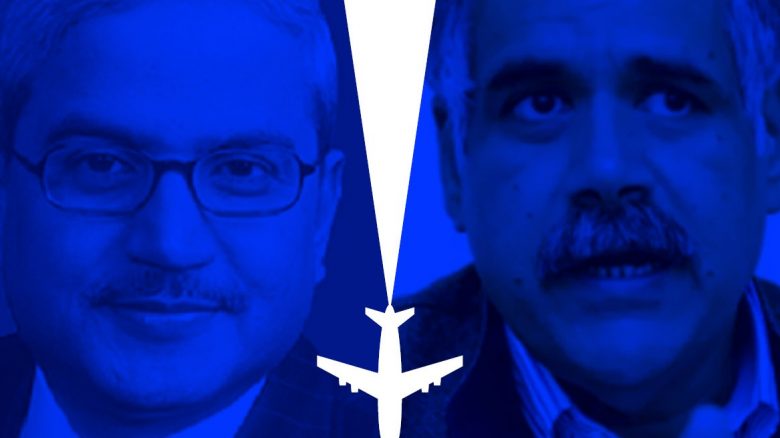- IndiGo, the crown jewel of the Indian aviation industry, is arguably among the most efficient airline companies in the world.
- The dispute among the two main promoters of the company that started in early 2019 is still haunting the organisation.
- The duo approached PMO, SEBI, and other regulatory as well as political bodies to resolve the dispute.
IndiGo, the crown jewel of the Indian aviation industry, is arguably among the most efficient airline companies in the world. But the dispute among the two main promoters of the company that started in early 2019 is still haunting the organisation. Rahul Bhatia, the majority owner (51%), is fighting a case against minority owner Rakesh Gangwal (48%) in Delhi High Court.
In 2005, Gangwal, who was earlier CEO of US Airways, teamed up with Bhatia – an airline sales agent – to set up a low-budget airline in 2005. In the last decade, IndiGo expanded rapidly and accounts for around 60 per cent of the domestic market share.
However, in 2019, a dispute started between Bhatia and Gangwal. “These unusual controlling rights seem to be the basis for the various violations of law and governance at IndiGo,” Gangwal said in a letter. “The nation can ill afford IndiGo to ever falter.”
The duo approached PMO, SEBI, and other regulatory as well as political bodies to resolve the dispute. A 250-page arbitration award was reached out between the two but Gangwal recently approached Delhi High Court to implement the award.
According to InterGlobe Aviation, which owns IndiGo, neither promoter had won the arbitration award, as it had favoured and gone against both of them in parts.
“The award has issued directions to each of the RG Group and the IGE Group in relation to the relief sought by them against each other. The award also directs the reimbursement of the costs incurred by the company in relation to the arbitration by the IGE group,” said the company.
Now it will be interesting to see when the duo settles the matter because there is a major split of the assets of the company or a management overhaul. At a time when Tata Group is looking to expand its pie in the aviation market by acquiring Air India and another ace business mind, Rakesh Jhunjhunwala is looking to enter the market, any major turbulence in the company’s structure or management could ensure the demise of the current leader.
Read more: Rakesh Jhunjhunwala is planning something big for Indian aviation
At the core of IndiGo’s success story is its strategy of operating only one category of aircraft, the Airbus 320. As per its official website, IndiGo has a fleet of 247 aircraft including 89 new generations A320 NEOs, 129 A320 CEOs, 22 ATRs, and 7 A321 NEO. This is in sharp contrast to the fleets of other airlines which consist of several categories of aircraft. Operating a single class of aircraft helps IndiGo in its cost-cutting efforts, which is critical for the success of a low-cost carrier.
Operating a single category of aircraft has resulted in two major benefits for IndiGo:
Firstly, better purchase prices. Take, for example, its first 100-aircraft deal with Airbus in the year 2005. At that time, the French aircraft maker, Airbus was looking to counter Boeing’s dominance in India. Owing to this factor, IndiGo was able to purchase the 100-odd aircraft at a favourable price, and this led to profitability in the first few years of its operations.
Secondly, owning a single category leads to a drastic reduction in costs of hiring, training, and upgradation that explains the profitability of the low-cost carrier.
However, as it looks to expand in other market segments from the earlier strategy of operating low-cost markets only and one type of airline, the operating complications are set to grow manifold. Pandemic has already induced huge losses for all airline companies, including IndiGo. If the split between Gangwal and Bhatia does not go well, their names will be included in the long list of billionaires who lost their fortunes in the airline business.
